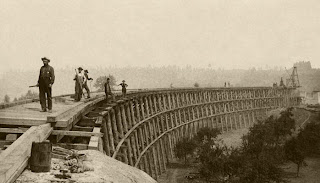 Understanding Craftsmanship…’what happened to America?’
Understanding Craftsmanship…’what happened to America?’So, what are the attributes of a craftsman? What makes a craftsman a craftsman? There are three basic attributes described herein:
1. Possesses the necessary knowledge and skills to perform the work
The craftsman is an expert in his field of endeavor; so much so that he could easily serve as an instructor in the subject matter. But the craftsman is also smart enough to know that education is not a onetime thing, that his world and field evolve as new tools and techniques are introduced. As such, the craftsman is a student of his profession and is constantly looking to improve himself. This is exercised through such things as continued education, routine certification, studying books and trade publications, and industrial groups. The craftsman willingly participates in trade groups, often at his own expense, in order to network with his peers.
It is Important to note that the craftsman does not need to be told he needs periodic training to sharpen his skills. Instead, he takes the personal initiative to stay on top of his game. Further, the craftsman has no problem with a periodic job review; in fact, he welcomes it for it might bring out a weakness in a skill he needs to sharpen.
2. Attention to detail
The craftsman understands and respects the process of building/delivering a product or service and is acutely aware of the penalties for cutting corners. Earlier (in part 2) we discussed the need for a methodology that specifies 5W+H. The craftsman is intimate with all details of his scope of work, so much so, he could probably write the methodology himself. Further, his intimacy of the work process means he can produce a reliable estimate of time and costs to perform the work.
Although many of the craftsman's tasks may be repetitive, it doesn't mean he easily falls into a rut. Instead, he is constantly looking for new tools and techniques to improve the work process. As such, he plays the role of Industrial Engineer who is normally charged with such a task.
The craftsman's attention to detail also means that he demonstrates patience in his work effort. Again, wary of cutting corners, the craftsman must possess such patience in order to produce the product the right way.
3. Views professional life as an extension of his personal life
The craftsman identifies with the end product which is where pride in workmanship comes from. In his mind, the craftsman has been charged with the responsibility of producing something, and wanting to satisfy the customer, puts forth his best effort to produce it. In other words, craftsmen take their work personally. This is a difficult trait to teach particularly in today's society where the focus is more on financial compensation than on the work product itself. It may sound naive, but the craftsman believes he will be suitably compensated for producing superior results.
Years ago, Dick Butkus of the Chicago Bears (NFL) confounded sports writers who could never understand why Butkus played as hard as he did year-after-year for a losing football team. True, Dick loved the game, but beyond that, the sports writers didn't understand one thing about the seven time All-Pro linebacker: Butkus took his job personally. It was important to him that his opponents know that they had been tackled by the best player; as he said, "When they get up from the ground I want them to say 'it must have been Butkus that got me'." Dick Butkus was a craftsman.
The craftsman has a burning desire to produce a superior product/service because he sees it as a reflection of himself. As such, the lines delineating their personal life and professional life are blurred. This is a significant characteristic that clearly separates a craftsman from the average worker. The craftsman's work is his life. He does not shirk responsibility, but rather embraces it with confidence and embosses his name on the finished product. Conversely, making a work related mistake of any kind pains a true craftsman.
Job titles are normally inconsequential to the craftsman who is more interested in delivering a quality product/service enjoyed by the customer. Instead, the craftsman takes pleasure in being touted as the best in his craft. He appreciates recognition; when someone makes a compliment about a product, the craftsman views it as a personal compliment. This too runs contrary to today's corporate world where people desperately seek recognition through simple job titles. Want someone with an inflated ego? Give them a big title.
Want something done right? Call a craftsman.
....more to come......
No comments:
Post a Comment